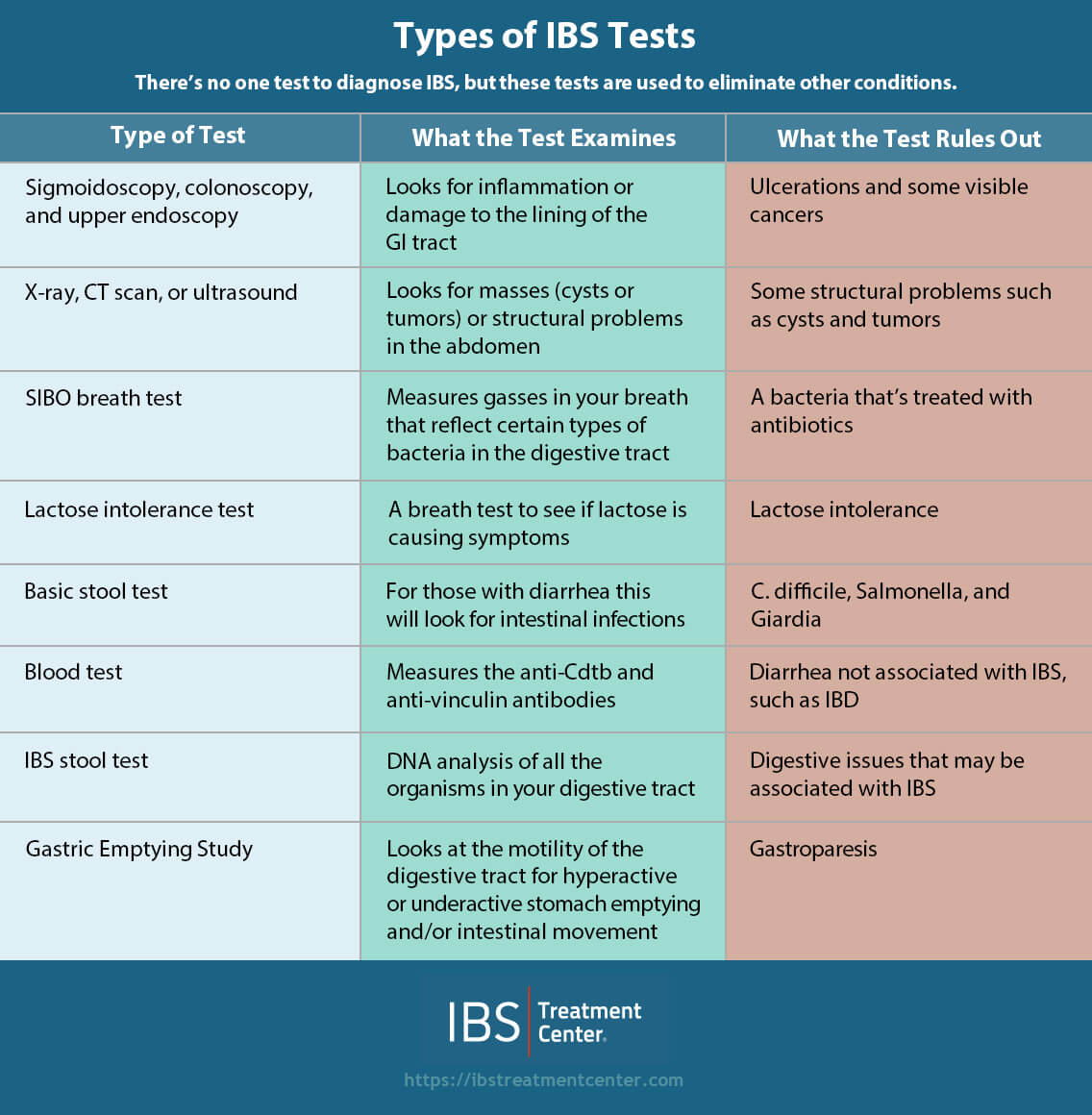In my 20 years of experience treating patients for IBS, I’ve administered hundreds of tests on thousands of patients. I’ll guide you through the process, explain the types of testing available, and what you can expect.
What Is IBS?
IBS (irritable bowel syndrome) is almost as straightforward as it sounds. If you have a digestive system that irritates you and affects your quality of life, then you probably have IBS. Depending upon the criteria used to define IBS, it occurs relatively frequently and has been over several months. For more information about IBS symptoms, visit our IBS Symptoms page.
How IBS affects people is not consistent from one person to the next. IBS can bring on abdominal pain or discomfort and often involves changes in stool quality, either loose or constipated, and may include urgency and either more frequent or less frequent bowel movements than normal. Those with IBS may also suffer from gas and/or bloating. IBS patients may experience only one of the changes mentioned, or any combination. Find out how IBS and pregnancy go together and how to safely manage your symptoms.
IBS is a widespread problem. It’s estimated that around 10 percent of the global population has IBS and that it affects approximately 10-15 percent of the U.S. population. If you’d like to learn more about IBS, read, “Frequently Asked Questions about IBS.”
Is There a Test for IBS?
Although patients with IBS generally undergo many tests, there is no one test for IBS. Physicians will perform tests primarily for ruling out other conditions.
Once referred to a gastroenterologist, you may undergo additional tests to those done by your primary care provider. The most common of these are visual exam tests, which include the flexible sigmoidoscopy, the colonoscopy, the upper endoscopy, and the capsule endoscopy. These tests are visual exams for your doctor to see inside your intestinal tract with a camera. Doctors are looking for inflammation or damage to the lining of your gastrointestinal (GI) tract.
These tests will rule out ulcerations and cancers that are visible to the doctor. The most common finding, if any, is a polyp found in the colonoscopy. Doctors will remove a polyp to help prevent the development of colon cancer. Other than that finding, these tests are not likely to shed light on your IBS.
Other types of imaging tests that you might undergo include an X-ray, CT scan, or ultrasound of your abdomen. These tests are primarily looking for masses or structural problems in your abdomen that can be affecting your digestion. Masses can include cysts or tumors, or may simply be a lot of stool sitting in your colon, which happens when you are constipated.
Doctors may also decide to administer a barium swallow test, which is a series of X-rays that evaluate the transit time of material moving through your digestive tract. The barium is a contrast fluid that will show up on the X-ray, thus allowing the doctor to measure how long it takes the material to move over time. There is also an ultrasound test for measuring transit time. If your transit time is extremely fast or slow, it will confirm diarrhea or constipation. Depending on the results of the test, your diagnosis may also be gastroparesis . Gastroparesis is a delay in stomach emptying time and is sometimes seen in conjunction with IBS. Note: While these tests can be interesting, they are usually describing symptoms of your IBS, not causes.
Another relatively common test is a SIBO breath test, which measures certain gasses in your breath. The gasses may reflect the type and amount of bacteria in your digestive tract. If positive, your doctor will prescribe an antibiotic to treat the bacteria. Currently, SIBO testing and its treatment are quite popular, although this test is not perfect and has many limitations.
Another breath test is the lactose intolerance test. This test can help determine if lactose intolerance is causing your symptoms. The test does not rule out dairy allergies, which are separate from lactose intolerance. More information about IBS allergy testing is below.
How to Test for an IBS Diagnosis
Many tests may be done en-route to an IBS diagnosis. These tests include questions, exams, and lab work. Your doctor will likely start with the simplest first and then move to more complex tests before referring you to a gastroenterologist.
To determine whether or not you have IBS, your doctor will likely first perform a physical exam, including an abdominal exam. The exam may include palpating and listening to your abdomen.
Equally important is for a doctor to take a detailed medical history and ask several questions about your symptoms. Your doctor will want to know all about the symptoms you are experiencing, when you experience them, how often you encounter them, how severe are your symptoms, how long they last, and when you first started experiencing them. They will also want to know what makes your symptoms better or worse. So, it’s a good idea to start taking notes about your symptoms, including when and how often they occur.
Once that is complete, a doctor will likely perform blood tests to evaluate your CBC, and blood chemistry, and to rule out celiac disease. If you have diarrhea, they may also run a basic stool test and evaluate it for certain intestinal infections such as C. difficile, Salmonella, and Giardia. If these tests are all fine, then they may refer you to a gastroenterologist for further evaluation.
Sets of Diagnostic Criteria for IBS
There are several different criteria and methods for deciding whether or not someone has IBS. They are all based on the symptoms reported by the patient rather than on test results. FYI, there is a tremendous amount of disagreement between physicians about what qualifies as IBS. Learn more about IBS and prostate issues that could be related.
The two most commonly described criteria for diagnosing (IBS) are the Rome criteria and the Manning Criteria. (Note: In our experience at the IBS Treatment Center, these criteria miss a large number of IBS patients because they require the presence of abdominal pain. Many IBS patients do not have what they would describe as pain. These criteria also overlook gas and bloating.)
The Rome Criteria for Diagnosing IBS
In 1988, the first Rome criteria were presented at the 13th International Congress of Gastroenterology in Rome. The guidelines were updated in 1999 for Rome II, and again in 2006 for the Rome III criteria. The Rome criteria require that a patient has recurring abdominal pain at least one day a week in the last three months. That pain should be associated with two or more of the following situations:
- Pain is related to defecation.
- Pain is associated with a change in stool frequency (stool occurs more or less frequently).
- Pain is associated with a change in the form (appearance) of the stool.
To meet the Rome criteria, patients must have three months of consistent symptoms. Patients must have started experiencing symptoms six months before diagnosis. Physicians may use the Rome criteria when all other testing appears normal.
The Manning Criteria for Diagnosing IBS
The Manning criteria was developed in 1976 and focus on having incomplete bowel movements, the relief of pain when passing a stool, bloating, changes in stool consistency and frequency, and mucus appearing in the stool. The criteria are a result of a report from Dr. Manning and his colleagues. They distributed a questionnaire to Bristol Wales outpatients who suffered from abdominal pain and abnormal bowel habits . They found that six out of 15 symptoms were more common in IBS, and those are the criteria that first formed the Manning criteria.
There has been a shift in the medical field for how to diagnose IBS. Previously, medical opinion focused on IBS as a diagnosis of exclusion, meaning a diagnosis could only be made after testing to exclude other disorders that could cause the symptoms. Now, some in the medical field believe IBS should be a diagnosis based on symptoms.
IBS Blood Test
Dr. Mark Pimentel has come up with a new blood test for diagnosing some types of IBS with diarrhea. This test measures two different antibodies: anti-Cdtb and anti-vinculin. The test may help exclude other problems (such as IBD) and may point to a bacterial cause of IBS. However, more studies are needed on this test. The test is essentially another way to try to diagnose SIBO, which is of limited value and is treated with antibiotics. For more information on IBS causes, read, “What Causes IBS?.”
IBS Stool Test
There is no specific stool test for diagnosing IBS, but everyone with IBS should have very comprehensive IBS stool testing. An IBS stool test, unlike regular stool tests, evaluates your entire microbiome as well as other factors that we can measure in a stool sample.
The best IBS stool test will evaluate ALL of the organisms in your digestive tract through DNA analysis of your stool sample. This evaluation includes hundreds of different organisms, all of your good bacteria, and any bad or even indifferent bacteria, as well as all other organisms such as viruses, yeast (Candida), parasites (protozoa), and worms. The test will also evaluate your stool sample for digestive enzymes, hydrochloric acid (HCI) production , inflammatory markers, and other digestive factors.
Your regular doctor and most gastroenterologists don’t do this type of stool testing. They only perform minimal types of stool testing. IBS experts are the only ones who do this type of comprehensive stool testing.
IBS Allergy Testing
IBS allergy testing is quite different from regular allergy testing. IBS allergy tests evaluate how foods affect your digestion, something not done by allergists (yes, it’s ironic), who focus on respiratory and skin problems. When allergists administer testing, they use skin prick or skin patch testing, or IgE blood testing, none of which are ideal for measuring IBS food reactions but might be better than no testing. A study done by dermatologists found some help in a small number of IBS patients.
There are many types of allergy tests available, and choosing the correct test for solving IBS is a complex issue. An IBS allergy test should involve at least one hundred different foods and include multiple types of antibody reactions that can be causing the reaction to the food. For more information about allergies and IBS, visit our page on Food Allergy and Intolerance Testing.
IBS Screening: Self-Testing Kit
Several different tests are being marketed online as self-testing IBS screening kits. You should know that no approved test can be done to determine whether or not you have IBS.
Taking one of these tests may give you the false impression that you have diagnosed your problem. However, if you have not seen your doctor, it is quite possible that you misdiagnosed your condition. The symptoms of IBS mimic numerous other diseases, and you should visit your doctor to ensure that you don’t have another health issue.
Even if you have visited your doctor and ruled out other problems, these are tests, not treatments. IBS is a vast and complex issue with numerous causes. You will still need to find an IBS expert to determine how to treat your IBS properly. For more information on IBS treatment, visit our page on IBS Treatments.
How to Prepare for Your IBS Test
There are a few things you can do to prepare for an IBS test. Most of those things have to do with how you’d prepare for any other medical test:
- Bring a friend or family member if possible to the appointment to help remember what the doctor tells you.
- Ask the doctor if there are any dietary restrictions you should follow before your appointment.
- Make a list of your symptoms, and if you can, include how often they occur and when.
- Write down any triggers or specific foods that are causing issues.
- Bring a list of your medicines, vitamins, and supplements.
- Bring along any essential medical information and think about any recent changes or stressors (ex. any unexpected weight gain or loss) that you may be experiencing.
- Ask your family if there is a history of other GI diseases like inflammatory bowel disease, celiac disease, or colon cancer?
- Make a list of the foods you eat regularly and what your daily diet looks like.
- Tell the doctor about any food allergies or intolerances.
Always Get Your Test Results
Do you always get your lab results? Do you even hear back from the doctor? All too often in health care, people have lab tests run and then never receive the results. It’s tempting to assume that no news is good news, and therefore everything is normal, but we all know what can happen when you assume things.
You may be surprised to learn that it is quite common for patients to be unaware of positive lab results from tests run by their doctors. This isn’t as often the case with procedures such as colonoscopies, endoscopies, and biopsies, but patients are more likely to be uninformed of the results of blood tests.
One example of this is anemia. Several times per year, while reviewing lab records that patients have brought with them, we will notice the presence of anemia (iron deficiency) that wasn’t disclosed to the patient. Upon asking, “Did you know you were anemic?” or “How did you treat your anemia?” they will respond with disbelief, or “What anemia?”
Why does this happen? That is an excellent question.
Maybe the diagnosis was overlooked. Maybe the diagnosis wasn’t seen as all that important. Neither answer is acceptable, but unfortunately, it is not the standard of practice for all medical professionals to review all lab work with patients. This lack of communication is the opposite of our standard at the IBS Treatment Center.
You should always review your lab work with your doctor and get a copy of it. If you don’t receive a copy, then ask for one. If the clinic is reluctant to give you a copy, then insist on it. You have a legal right to your lab work, and you are the sole repository of your complete medical history. There is no central location that stores all lab results. If you switch doctors, move, or for some reason, need your old lab results, then you are at the mercy of your previous clinic to provide them.
Doctors move on, clinics close, and records are lost. And in our experience, it is not unusual for other clinics to fail to provide us your medical records when you have requested that they do so.
How the IBS Treatment Center Tests for IBS
The IBS Treatment Center uses a variety of methods to diagnose and treat IBS. We personalize the testing for each patient based on their unique symptoms and history. Learn more about our approaches to treating IBS. Those methods include IBS diets, procedures and therapies, medications, and supplements.
Schedule an appointment to find out if you have IBS and how we can treat it.

Dr. Wangen is the founder and medical director of the IBS Treatment Center, the award winning author of two books, and a nationally recognized speaker on digestive disorders. He has been on ABC, NBC, and Fox as well as public radio, and was named one of Seattle’s Top Doctors by Seattle Magazine.



